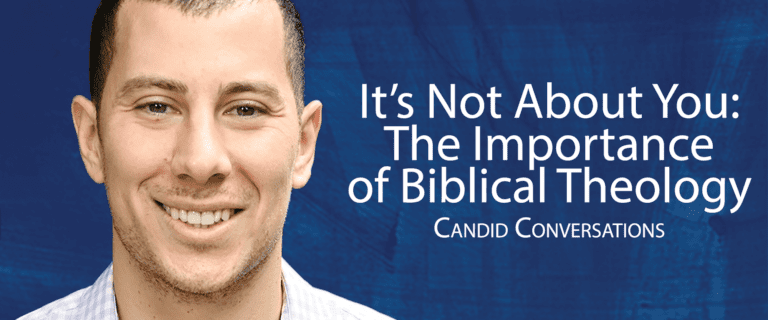How are all the Bible stories we learned in our youth related? What do we do with parts of Scripture that we don’t understand? At a loss for how to read the Bible better, we often either gloss over them or make them about ourselves, missing out on the richer, more fulfilling message. In this conversation, Jonathan Youssef and author Nancy Guthrie discuss the beauty of Biblical theology—what it is and how it leads us to an abounding faith in God.
This conversation is condensed and adapted from episode 191 of Candid Conversations with Jonathan Youssef. Subscribe today on your favorite podcast platform or listen online at LTW.org/Candid.
"I would say there is nothing more practical than the urgency of being joined to Jesus Christ."
Jonathan: [Nancy,] you’re making your way around the U.S. and the UK and a few other places [with your Biblical Theology Workshop for Women]. I wonder if you could help us understand what you mean by Biblical theology. Is it Biblical theology as opposed to unbiblical theology? And what’s the difference between Biblical theology and something like systematic theology?
Nancy: The first time I heard the term Biblical theology I made the assumption that we’re talking about theology that is Biblical as opposed to unbiblical. But actually, there are numerous kinds of theologies because theology is the study of God. For example, historical theology is the study of what has been believed about God throughout history.
I think what I grew up being taught most and, frankly, what most people grew up learning in the church, was doctrine. We would call that systematic theology. And in systematic theology, we are collecting from the Bible a comprehensive, coherent summary of what the Bible teaches on various topics: sin, judgment, the image of God, those kinds of things.
Biblical theology, however, is a way of understanding and approaching the Bible that recognizes that, even though the Bible is made up of various kinds of literature and was written over centuries by 40 human authors, it is really telling one cohesive story about what God is doing in the world through Christ. Biblical theology recognizes that the Bible has a number of central themes that span from Genesis to Revelation, each serving to communicate a coherent message about the person and work of Christ.
In Biblical theology, rather than creating a coherent summary of what the Bible says about a topic, it’s more about themes that develop. A story usually begins with some characters and a setting, and there is some kind of crisis. And then there’s developing action, which comes to a climax where the crisis is resolved, and then the story resolves. The story of the Bible follows exactly that pattern.
I grew up being taught a lot of the stories in the Bible, but they were not connected. I couldn’t have put them on a timeline in the proper order. And so what difference does that make? Well, it makes a huge difference. It means that I’m not understanding how those smaller stories fit into the larger story, and therefore, I’m probably misinterpreting them. I’m probably not making them about who Christ is and what He accomplished, but rather, about what I’m supposed to do and who I’m supposed to be. And it’s not that those stories have no implications in that regard, but the first thing we must see is what they have to tell us about who Christ is and what He has accomplished.
Jonathan: Yes, He’s the central theme of the whole of Scripture. "In the Beginning was the Word, and the Word was with God and the Word was God," [as John’s prologue] sets in stone. And beginning with the first Gospel—that pre-Gospel in Genesis 3:15, that the seed of the woman will crush the head of the serpent—Scripture anticipates the one who will come.
But you’re right, if we read Scripture as just a historical narrative, the stories will feel disconnected. So we try really hard to connect them to our lives, to ourselves, and then it becomes not a Christ-centered text, but a man-centered text: What does the Bible say about me? I’m the main player. I’m the main character. And I’m sure in your work in this field, you’ve picked up on what the implications of this are for people’s lives—when they become the center of the story.
Nancy: Absolutely. It becomes all about me, what I’m supposed to do, and that’s a really heavy burden. And it’s just not the Gospel. The Gospel is all about who Christ is and what He has done, and so the most urgent response is not to try harder to be a better person, but rather, to become joined to Christ. We must be vitally joined to Him by faith.
And that’s what I love about teaching Biblical theology. I introduce this idea of Biblical themes, themes that the divine authority has written into His book that help us get to the main message He wants us to get. So as you gaze at Christ from all of these angles that the Biblical themes provide to us, you see more clearly His beauty, His sufficiency, and His necessity. And that’s what we need to see most of all when we go to the Bible.
Now, some people will say, "Well, we want to give people something practical." I would say there is nothing more practical than the urgency of being joined to Jesus Christ.
Jonathan: Which is [our] greatest need.
Nancy: And actually, it’s only as we see His beauty and sufficiency and necessity that we have any desire to obey. I pray for all the people who register [for my workshops by name] that they will love Christ more and that the workshop will cause them to long more for His return. And I say that, Jonathan, because most of my life my understanding of the Christian life was that I make a decision for Christ, I try really hard to live for Him, and then I go to heaven when I die.
I hope that women walk away from the Biblical theology workshop with a greater sense of the whole story, which makes a difference in their story. That their life in Christ is not simply to go to heaven when you die and live forever as some kind of spirit with no bodily existence. No, the next big event in the story is Christ’s bodily return and His ridding the whole of creation of the curse that has infected it, when His blessings will flow far as the curse is found. That’s our glorious future that I want to set hearts on, that the Bible is giving to us again and again. We don’t want anything less than that.
Share
Recent MY Journal

3 Truths to Carry You Through Every Storm in 2025
January 13, 2025
Ask Dr. Youssef: “When life gets busy, how do I make space for consistent prayer and Bible study?”
January 12, 2025
Sign Up for Ministry Updates




